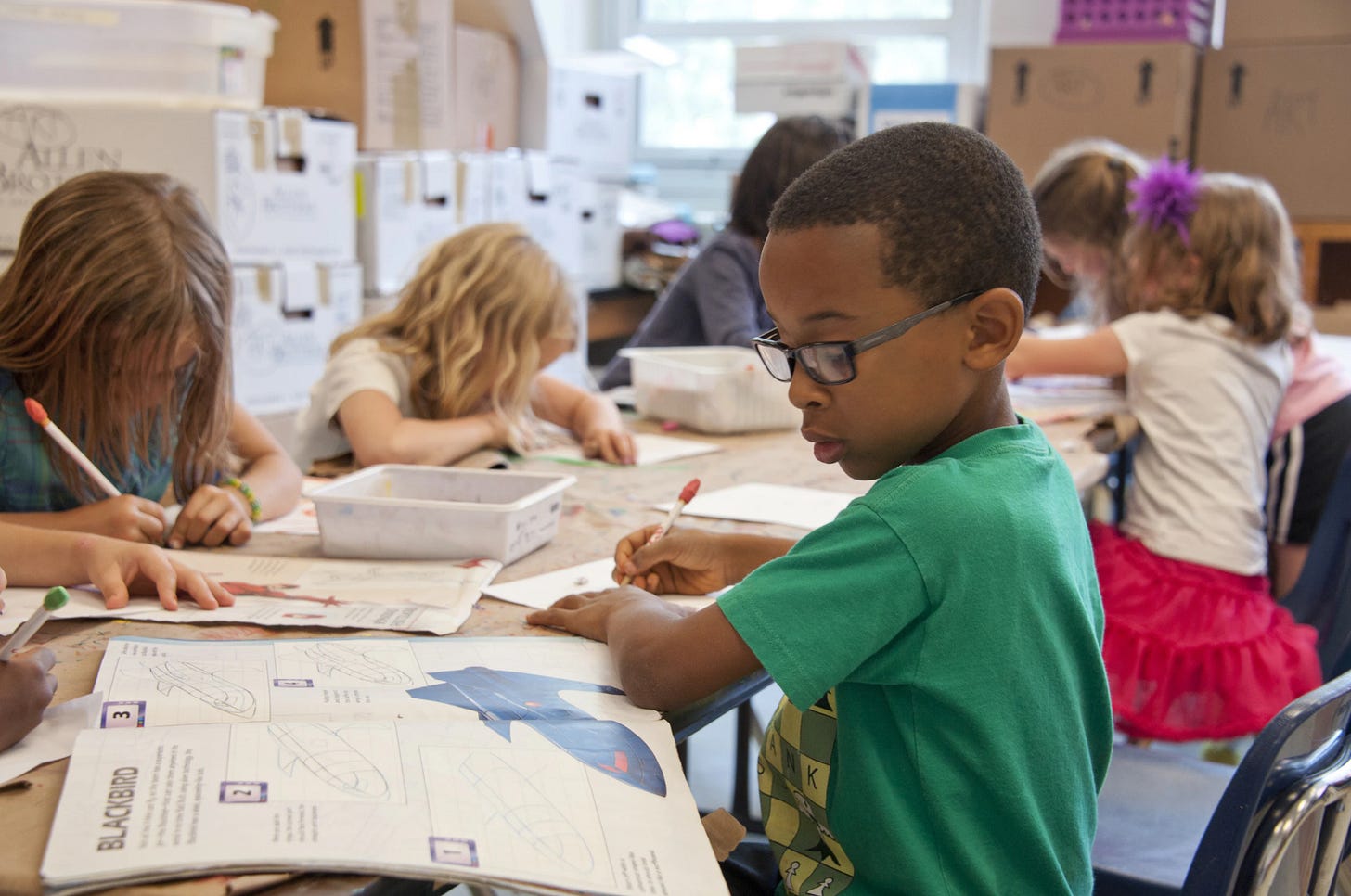The Times ran a piece yesterday about the UK government’s new campaign to improve school attendance. Attendance—or really, non-attendance—is a big problem. 1 in 5 children miss a day or more a fortnight. Over 140,000 children miss over half their school days, out of a school population of about 10.7 million.
Whatever you think about school education, if a child’s education is meant to be happening in school, a 50% attendance rate isn’t going to result in a very good education. Presumably we can all agree that Something Must Be Done.

The government today announced plans to invest £15m in addressing this problem. I’m not expert enough on the specific policies to judge them. But what irks me are some of the soundbites coming out on this topic:
Every day our children are in school is so incredibly important. It damages their life chances when they aren’t there.
—Bridget Phillipson, Shadow Education Secretary
…we know that attending school is vital to a child’s wellbeing, development, and attainment, as well as future career success.” And “The benefits of our success in raising education standards can only be when all children are in school.”
—Gillian Keegan, Secretary of State for Education
“Every day counts: when children miss school, it’s not just about missing lessons, it’s also about losing valuable moments spent with their friends and teachers.”
—Rachel De Souza, Children’s Commissioner for England and Wales
The Times reports that “the government said it wanted to target families who saw nothing wrong with the occasional day off or who kept children home if they had a mild cold.”
The 140,000 children missing half their education need serious support. But those are not the children missing ‘occasional days off’, and to target parents whose children miss the occasional day is nonsense, and will be rightly regarded as such. The Centre for Social Justice says the bond between parents and schools needs to be restored—I agree. But this is not the way to go about it.
Why do occasional days off not matter? Because, as anyone who has ever taught, or learnt, anything will know, you can’t teach something once, on a particular Tuesday, and never refer to it again. A 5 year old who misses the day their class learns about the number 7 will not spend the rest of their life wondering what happens between numbers 6 and 8. A 16 year old who misses a lesson on Romeo and Juliet still stands a good chance of understanding the play as much as their peers who attended every class. I missed nearly an entire term of my GCSE year (aged about 15) due to illness, and still got top grades. Granted, I come from an educated family that values education, and I was a classic conscientious schoolgirl. I’m not recommending everyone should skip a term and see what happens. But it’s just not true that a missed day at school is an irreparable loss in a child’s education or childhood, and to suggest otherwise invites ridicule from sensible parents who know better.
As to the idea that attending school is ‘vital to a child’s wellbeing’… Alas, if only that were true. As a home educator I have met so many parents whose children were miserable at school, and who were utterly failed by the schools that should, ideally, have supported them. In online home ed forums there are more parents every day asking for help because school, in fact, is completely detrimental to their child’s wellbeing. Interestingly, the parents who ask about home ed because their child is miserable at school are usually desperate for a way to help their child stay in school. They don’t have any desire to home educate, they just feel they have little choice left open to them because the school system has failed them so comprehensively.
And “the benefits of our success in raising education standards can only be when all children are in school”? No wonder the thousands of home educating families in the UK sometimes feel the government isn’t entirely on their side!
I know that there is a small number of families who don’t value education. They don’t send their children to school and they’re not home educating either, and perhaps they don’t really care. Of course these children need help and support.
But the vast majority of parents want the very best for their children. Sometimes that means giving them occasional days off. There is much to learn about our world and ourselves that can be learnt outside the classroom. The amount of brand new learning that happens in a typical school day is very, very small, and if it’s of any value at all it will come up again.
How we homeschooled today
The first part of the morning felt like trying to walk up a down escalator, but luckily things improved!
I noticed recently that my son’s (just 6) addition had slipped slightly after so much focus on multiplication. Everything involves counting on his fingers, and I want to encourage other methods and ways of thinking. So this morning we got out Tiny Polka Dot and played different addition games for an hour (because they were enjoying it, not because I insisted on an hour’s session). I mostly wanted us to just enjoy the games, but I also made a point of reminding the children of simple addition strategies (like put the big number first, or add 10 instead of 9 and then take away 1). **Don’t forget the How We Homeschool Math For Love discount! 15% off for US and UK readers.**
Then they took themselves outside to play for an hour. It’s cold in London and I don’t know what inspired them to spend so long in the garden, but I was very pleased! They remembered that moss has antimicrobial properties, which we read about recently, so collected some to treat any wounds they might incur while riding their bikes. I reminded them not to collect too much because moss is an important microhabitat. (I also hoped they didn’t fall off their bikes and wipe dirty, muddy, city moss on their injuries…)
Back inside for a little handwriting, which was straightforward for my daughter (8, just working on her joined-up writing), and deeply challenging for my son. Instead of him copying whole words I got out the tea leaves. We have a shoebox lid with a thin layer of tea leaves and coffee grounds in it, which is great for writing big letters in using your finger before progressing to pencil and paper. We’re going to try using this daily, and I suggested to him that it would be very beneficial if he could also spend two minutes practicing the same letter in the afternoon too. Let’s see how that goes.
Then Greek. I had two new words for them today, and then they chose 8 and 6 flashcards respectively (because those are their ages, obviously), to revise. It was a very enjoyable and successful session. Yesterday we went to the British Library exhibition Fantasy: Realms of Imagination, and my daughter was thrilled to be able to recognise Greek letters in a 14th century book of the Iliad. Result!
At lunch I read to them from The Young Oxford History of Britain and Ireland. This is a new book for us (a library book). It’s aimed at older children, being very comprehensive. I was frustrated at the lack of children’s books on subjects like The Hundred Years’ War—sometimes it seems that children’s British history books go from Saxons, Vikings, and Normans straight to the Tudors, missing out several hundred years in the middle (Black Death aside). Today I read aloud about growing up in medieval times, and life in the monasteries. Some of it went over their heads, but overall I felt it was good.
After lunch my daughter asked to get out her microscope. I never quite feel we’ve got to grips with the microscope, and I really should read the manual that came with it more thoroughly. But this afternoon we saw rounded carrot cells, cubic salt crystals, and a tiny piece of moss. And we talked about why salt doesn’t have cells.
Then my husband came home and took the children off to a bookshop to spend some book vouchers, and I
opened a bottle of Champagnewrote this.
Thanks for reading. If you’re not subscribed, sign up for free and never miss a post.





I had a slight change of perspective on this when a teacher pointed out that 3 kids missing one day and then a different 3 kids missing another day means you’re always trying to juggle who has learned what and who is now a bit behind. (But in general I agree with you - though I might feel differently if my children were struggling in school and needed to hear things more than once).
You're my heroine! And you're right about the odd day off....